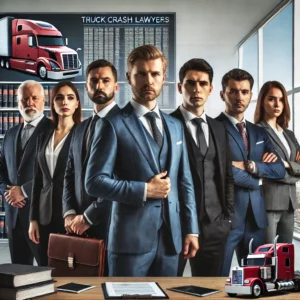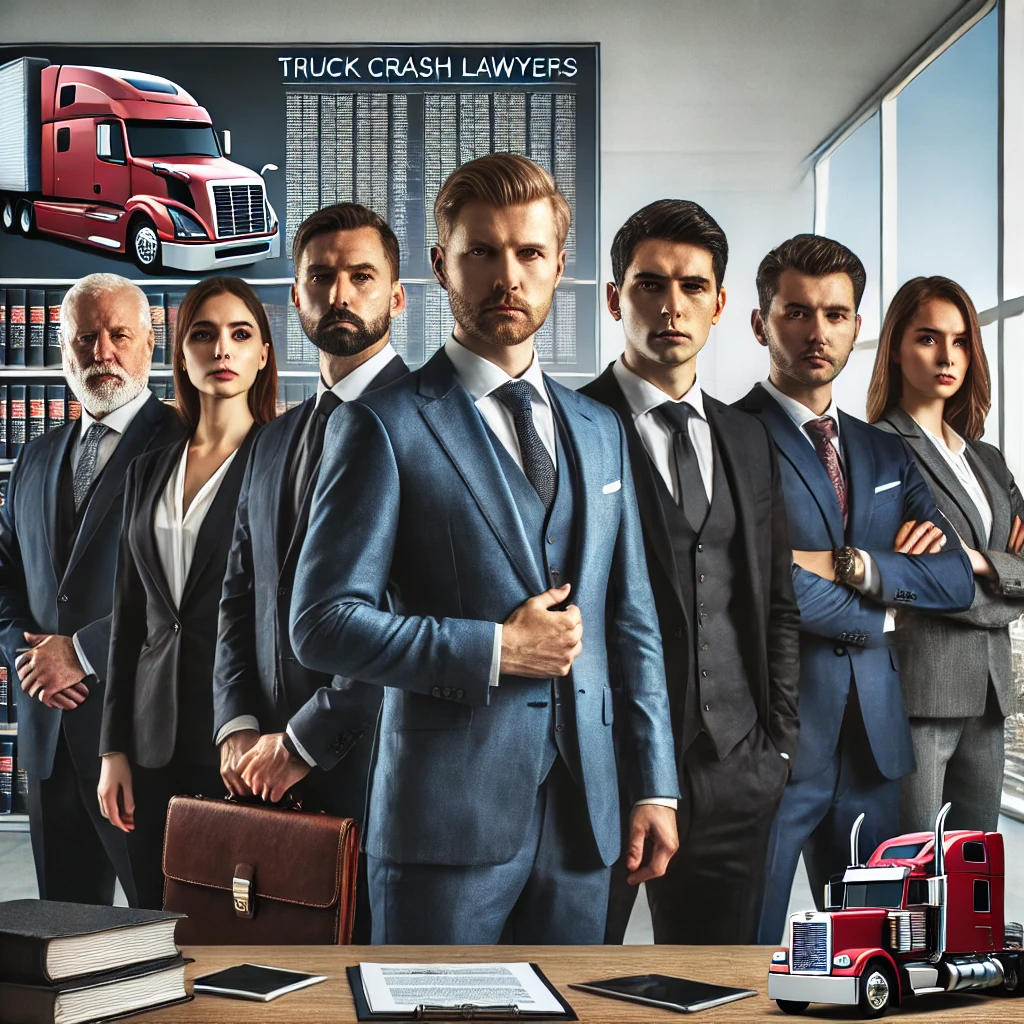“Truck crash lawyers” are legal professionals who specialize in handling cases involving accidents with large commercial trucks, such as semi-trucks, 18-wheelers, or delivery trucks. These lawyers are experts in personal injury law, particularly in areas involving motor vehicle accidents. They help victims of truck accidents seek compensation for injuries, property damage, medical expenses, lost wages, and emotional distress.

Key responsibilities of truck crash lawyers include:
Investigating the Accident: They work to determine liability, which could involve the truck driver, the trucking company, or even the manufacturer of the truck or its parts.
Negotiating with Insurance Companies: They often negotiate with insurers to get fair settlements for their clients.
Litigation: If a settlement cannot be reached, they represent the victim in court.
Compliance with Trucking Laws: Truck crash lawyers must understand federal and state regulations governing the trucking industry, such as the Federal Motor Carrier Safety Regulations (FMCSR), which set rules for hours of service, truck maintenance, and driver qualifications.
Truck crash cases are typically more complex than regular car accident cases due to the size and nature of the trucks involved, the severe injuries they can cause, and the multiple parties that may be liable.
1. Complexity of Trucking Accidents
Multiple Parties: In truck accidents, more than one party may be held liable, such as the truck driver, the trucking company, the truck’s owner, the cargo loader, or even the truck’s manufacturer. This makes determining fault more intricate.
Severe Injuries: Truck crashes often result in more severe injuries or fatalities due to the size and weight disparity between trucks and passenger vehicles. The victims may suffer catastrophic injuries like traumatic brain injuries, spinal cord injuries, or wrongful death claims.
Large Insurance Companies: Trucking companies often have large, well-funded insurance carriers who aggressively defend claims to limit their payouts. A specialized lawyer knows how to handle these insurance companies.
2. Understanding Trucking Laws and Regulations
Federal and State Regulations: The trucking industry is regulated by both state and federal laws. Federal Motor Carrier Safety Administration (FMCSA) regulations control everything from driver qualifications to truck maintenance and operation hours. Violations of these regulations can be critical evidence in a lawsuit.
Hours of Service: Lawyers will often investigate whether the truck driver followed mandated rest periods. Drivers often exceed their legal hours to meet tight deadlines, leading to fatigue and accidents. Logs (either electronic or written) may be checked for compliance.
Maintenance and Inspection Records: Trucking companies must maintain their trucks properly. A lawyer will often investigate maintenance logs, inspection records, and the overall condition of the truck to see if mechanical failure contributed to the accident.
3. Investigation and Evidence Gathering
Accident Reconstruction: Truck crash lawyers often work with accident reconstruction experts to determine the cause of the crash. They analyze skid marks, damage to vehicles, black box data (from the truck’s onboard electronic system), and witness statements.
Black Box Data: Most commercial trucks are equipped with event data recorders, commonly referred to as “black boxes.” This data can reveal critical information, such as the truck’s speed at the time of the crash, braking patterns, and other factors.
Driver Background Check: Lawyers will review the truck driver’s history, including any past traffic violations, DUIs, or records of unsafe driving.
4. Negotiating and Settling Claims
Dealing with Multiple Insurance Policies: Truck drivers, trucking companies, and even cargo owners may all have separate insurance policies. Truck crash lawyers must understand how to navigate through the complexities of different policies to maximize compensation for their clients.
Economic and Non-Economic Damages: Truck crash lawyers seek compensation for economic damages like medical bills, future medical expenses, rehabilitation costs, lost wages, and property damage. They also fight for non-economic damages such as pain and suffering, emotional distress, and loss of quality of life.
5. Litigation and Trial
Expert Witnesses: In many truck crash cases, expert testimony is crucial. Lawyers often bring in medical experts, engineers, accident reconstruction specialists, and economists to strengthen their case.
Court Proceedings: If negotiations fail, truck crash lawyers are prepared to take the case to trial. They present evidence, cross-examine witnesses, and argue the case before a judge or jury to secure fair compensation for their clients.
6. Types of Truck Accidents
Truck crash lawyers deal with various types of trucking accidents, such as:
Jackknife Accidents: When the trailer of the truck swings out and forms a 90-degree angle with the truck’s cab.
Rollover Accidents: When the truck overturns, often due to excessive speed, sharp turns, or poor road conditions.
Underride Accidents: When a smaller vehicle slides underneath the trailer of a truck.
Cargo-Related Accidents: Improperly secured cargo can cause the truck to lose balance or spill onto the road, leading to accidents.
7. Compensation
Truck crash lawyers work to secure compensation for:
Medical Bills (current and future)
Rehabilitation and Physical Therapy
Lost Wages and Loss of Earning Capacity
Pain and Suffering
Emotional Trauma
Disfigurement or Disability
Loss of Consortium (for spouses or family members)
1. Unique Challenges in Trucking Accident Cases
Higher Stakes: Truck crashes typically result in more serious injuries and fatalities due to the sheer size and weight of the vehicle. These higher stakes mean that insurance companies and trucking companies will fight harder to minimize their payouts.
Multiple Legal Theories of Liability: The complexity of determining fault can be daunting. Potential liable parties could include:
Truck Drivers: Driver negligence (e.g., distracted driving, DUI, or speeding) can make them liable.
Trucking Companies: They may be held responsible under theories of vicarious liability (when the driver is an employee) or for their own direct negligence (failing to maintain vehicles, improperly training drivers).
Third Parties: Maintenance companies, cargo loaders, or even parts manufacturers could be involved if a mechanical issue or improper loading caused the accident.
Aggressive Defense Tactics: Trucking companies often employ legal teams and accident investigators to respond to a crash within hours. These teams are dispatched to protect their company’s interests, gather evidence that favors them, and limit liability.
2. Trucking Industry Specifics and Legal Violations
Driver Fatigue: Truck drivers are often under pressure to meet tight deadlines, leading to extended hours behind the wheel. This pressure can push them to violate FMCSA hours-of-service regulations, leading to fatigue—a major cause of accidents. Truck crash lawyers focus on identifying whether drivers exceeded these limits or falsified logbooks, a common tactic used to evade regulations.
Substance Abuse: Some truck drivers may resort to using stimulants to stay awake during long hauls. A lawyer will seek toxicology reports to determine whether the driver was under the influence of drugs or alcohol at the time of the accident.
Improper Loading and Weight Limits: If cargo is improperly secured or loaded, it can shift during transit, leading to loss of control or rollover accidents. Federal law restricts the weight of trucks, and violations can cause brake failures or instability. Lawyers work to uncover any violations in cargo weight or loading practices.
Defective Equipment: Trucks must be regularly inspected and maintained, but sometimes mechanical failures like brake failure, tire blowouts, or steering malfunctions lead to crashes. A truck crash lawyer will examine whether proper maintenance protocols were followed and whether defective parts played a role in the crash.
3. Common Defenses Used by Trucking Companies
Trucking companies and their legal teams often use several defenses to avoid liability:
Comparative Negligence: The trucking company may claim that the victim was partially or wholly responsible for the accident. For example, they could argue that the other driver was speeding, changing lanes improperly, or driving under the influence.
Independent Contractor Defense: Trucking companies may argue that the driver was not an employee but an independent contractor, attempting to distance themselves from liability. Truck crash lawyers counter this by looking at how much control the company had over the driver’s operations, which could prove the company’s responsibility.
Sudden Emergency Doctrine: The defense might claim the accident was caused by an unexpected emergency beyond the driver’s control, like a sudden mechanical failure or a third-party vehicle’s unpredictable actions.
Pre-Existing Conditions: The defense may argue that the injuries sustained in the crash were pre-existing or aggravated by something else rather than caused by the truck accident itself.
4. Investigation and Evidence Collection Techniques
Successful truck crash cases depend on thorough investigations and uncovering crucial evidence. Some important areas include:
Truck’s Black Box (Electronic Logging Device): These devices record crucial data such as the truck’s speed, brake usage, and driver hours leading up to the crash. A truck crash lawyer will subpoena this data to determine whether the driver violated any safety rules.
Dashcam Footage: Some trucks are equipped with dash cameras, which may capture footage of the moments leading up to the accident. Obtaining this footage can be a game-changer in proving liability.
Tire Marks and Vehicle Damage: Accident reconstruction specialists analyze the scene for tire marks, debris, and vehicle damage patterns to determine how the accident occurred. Skid marks, for instance, can show whether the truck attempted to brake before the crash.
Witness Testimonies and Surveillance Footage: Witness accounts from other drivers or pedestrians can provide a neutral perspective on the crash. Surveillance footage from nearby buildings or traffic cameras can also be used to reconstruct the events.
5. Strategies for Maximizing Compensation
Pain and Suffering: Truck crash lawyers often seek compensation not just for the economic damages (medical bills, property damage, lost income) but also for non-economic damages like pain and suffering, emotional trauma, and loss of enjoyment of life.
Future Medical Expenses: Serious injuries like traumatic brain injuries or spinal cord injuries often require long-term medical care. Lawyers use medical experts to estimate the cost of future treatment, ensuring that the client is compensated for ongoing expenses.
Loss of Earning Capacity: If the victim’s injuries prevent them from returning to work or reduce their ability to earn in the future, truck crash lawyers will calculate the potential loss of earnings and include it in their claim.
Punitive Damages: In cases where the trucking company or driver acted with extreme negligence or willful misconduct (e.g., driving under the influence or knowingly violating safety regulations), the lawyer may seek punitive damages. These damages are intended to punish the wrongdoer and serve as a deterrent.
6. Settlement Negotiations vs. Trial
Negotiating with Insurance Companies: Most truck accident cases are settled before reaching trial, but this doesn’t mean the process is easy. Truck crash lawyers use leverage like evidence of regulatory violations, expert testimony, and detailed accident reconstructions to negotiate favorable settlements. Insurance companies often start with lowball offers, but an experienced attorney knows the true value of the case and fights to get what’s fair.
Going to Trial: If negotiations fail, a truck crash lawyer is prepared to take the case to trial. They must present a compelling argument to the jury, showing the extent of the injuries and the liability of the truck driver or company. Trials can be lengthy and complex, but they can also result in higher compensation when the trucking company is found at fault.
7. How Truck Crash Lawyers Work on a Contingency Fee Basis
No Upfront Costs: Most truck crash lawyers work on a contingency fee basis, meaning they only get paid if they win the case or secure a settlement. This arrangement allows victims to pursue legal action without worrying about upfront legal fees.
Percentage of Settlement: The lawyer’s fee is typically a percentage of the final settlement or judgment. The exact percentage can vary but often ranges between 25% and 40%, depending on the complexity of the case and whether it goes to trial.
Conclusion: Why Hiring a Truck Crash Lawyer Is Essential
Truck accidents involve high stakes, complex legal rules, and fierce defense tactics from trucking companies. Truck crash lawyers play a vital role in protecting victims’ rights, ensuring they receive fair compensation for their injuries and losses. By leveraging their deep knowledge of the trucking industry, legal expertise, and strong negotiation or trial skills, these lawyers help accident victims navigate the legal process and recover from the devastating impact of truck crashes.


